Frank's travels around Britain 2006.
Paddock Wood Western show.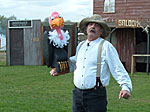
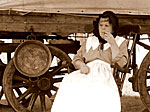 "Badger"
is a friend from my favourite motorhome site. He travels round, putting on
excellent displays
connected with his interest in Westerns & the life surrounding that mythic
period of American history. What a great reason to head for Kent and join his
merry band at Paddock Wood Hop Farm. Many Western devotees were there,
Indian dancers, Civil War re-enactors and traders of all the Western
paraphernalia you could wish for. They was a display of American cars and it was
topped off by Badger's Wild West Town erected for the weekend. It was filled
with all the characters you'd expect to see in Dodge City or Tombstone. There's
plenty of gunfighters, a medicine show and lots of law-breakers.
"Badger"
is a friend from my favourite motorhome site. He travels round, putting on
excellent displays
connected with his interest in Westerns & the life surrounding that mythic
period of American history. What a great reason to head for Kent and join his
merry band at Paddock Wood Hop Farm. Many Western devotees were there,
Indian dancers, Civil War re-enactors and traders of all the Western
paraphernalia you could wish for. They was a display of American cars and it was
topped off by Badger's Wild West Town erected for the weekend. It was filled
with all the characters you'd expect to see in Dodge City or Tombstone. There's
plenty of gunfighters, a medicine show and lots of law-breakers.

 The
first draw back I realised I was heading into, was the small
amount of time I was down there for. A weekend was very short. This led on to
the idea of doing a Monday to Thursday break and leaving my Motor home interests
to a Saturday or Sunday day out. Why not? I'm retired, why restrict yourself to
the weekend. It was getting easier to get in places mid week too!
The
first draw back I realised I was heading into, was the small
amount of time I was down there for. A weekend was very short. This led on to
the idea of doing a Monday to Thursday break and leaving my Motor home interests
to a Saturday or Sunday day out. Why not? I'm retired, why restrict yourself to
the weekend. It was getting easier to get in places mid week too!
I'd never been to this area before.
In my life, the only connection I made with this area was Biggin Hill, Hawkinge &
other WW2 fighter bases. People had told me Kent was the garden of England and I
had passed through on the way to the tunnel at Dover.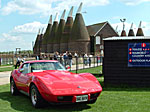
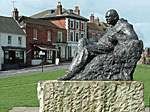 To
most Southerners, this was the place steeped in the history of the Hop pickers from
London's East End.
In early September the hops would be
ready for picking.
Hop picking in Kent was carried out mainly by London
families that came down for a working holiday. Some farms had hop pickers' huts
in the Hop Gardens for the use of these families. Some families used to bring
their own wallpaper to make it their own "home". Cooking and heating water was
carried out on a wood fire outside. Paddock Wood even had its own "Hop Pickers
Hospital".
To
most Southerners, this was the place steeped in the history of the Hop pickers from
London's East End.
In early September the hops would be
ready for picking.
Hop picking in Kent was carried out mainly by London
families that came down for a working holiday. Some farms had hop pickers' huts
in the Hop Gardens for the use of these families. Some families used to bring
their own wallpaper to make it their own "home". Cooking and heating water was
carried out on a wood fire outside. Paddock Wood even had its own "Hop Pickers
Hospital".
This is the memory of just one picker:
The start of the
day's picking was signalled by the farm foreman shouting "pull binds". Hops were
picked into bins made of two poles from which a sacking "cradle" hung. The poles
were supported on crossed wooden legs at each end of the bin. Some families had
whole bins others less prolific had "half a bine" shared with others. The bin
was divided down the middle with a sacking partition.
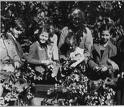 By
the time the hops were ready for picking in September, the hop twine was almost
rotten and all that was required was a good tug to release the bine from the top
wire. Sometimes you would find a big hair caterpillar on the bine, we called
these "Hop Dogs".
By
the time the hops were ready for picking in September, the hop twine was almost
rotten and all that was required was a good tug to release the bine from the top
wire. Sometimes you would find a big hair caterpillar on the bine, we called
these "Hop Dogs".
Every day Mr Podmore the farmer would come round with the
Farm Secretary and the Farm Foreman to measure your hops. If you had "dirty
hops" - leaves and stalks in with the hops - he would shout out "dirty hops" and
pass you by.
He would measure out your hops with a wicker "bushel"
basket and you were paid at so many pence per bushel. As he measured them out he
would shout "one- a, two-a, three-a" etc and the secretary would note your tally
for the day. The hops were measured out into big sacks called "pokes" which the
foreman would hold whilst Mr Podmore measures out the hops. The pokes were
filled until they were almost solid, and then loaded onto a flat horse drawn
cart. They were then taken off to the Oast House where they were dried over a
charcoal fire.
Lunchtime was signalled by a shout from the foreman -
"dinnerrrr". Our lunch would consist of assorted sandwiches and my Mum's meat
pie (with a short-crust pastry - often undercooked towards the centre!) followed
by apple pie made with the same pastry! and a cup of tea. The tea was brewed in
a black kettle, kept for the occasion, which was stood on two bricks with a fire
of dry hazel twigs in between the bricks.
The end of the day was signalled by "stop pickingggg!" from
the foreman.
Home was a trek across the fields with the pram and a good
wash to try and get the hop smell and stains off your fingers.
I think the show was about £6 to go in & that included the Hop museum. The weather was glorious, the show terrific & the countryside beautiful on my first outing. I thought that this was going to be a great start to a new venture. I found lovely villages like Westerham, with deep connection to Winston Churchill and his house called Chartwell. In 1922 Winston Churchill MP purchased Chartwell Manor on the outskirts of Westerham, which, apart from the time he spent at 10 Downing Street, was his home for the rest of his life. Chartwell is now in the hands of the National Trust. There is a statue of Sir Winston Churchill on the village green at Westerham. It was executed by Oscar Nemon and stands on a base of Yugoslavian stone, the gift of Marshal Tito.
Links for information on this page:
